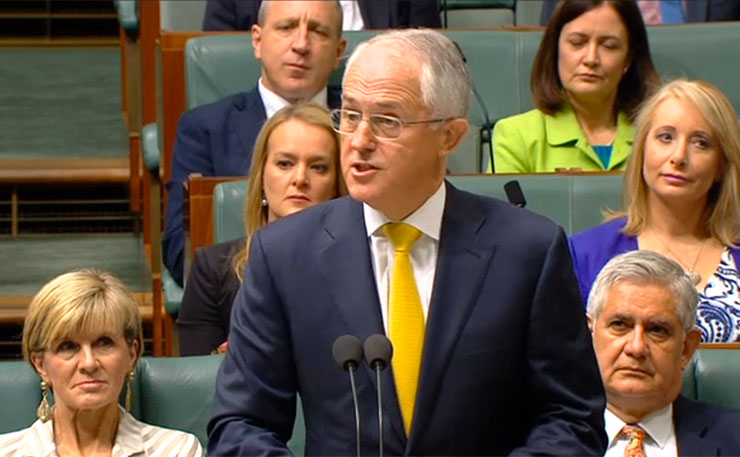OPINION: The PM is serving up an ideological dish that has well and truly past its used by date. This is not Machiavellian genius, let alone sound economic policy. It’s another in a long series of attacks on Australian workers by the Coalition, writes Liam McLoughlin.
Stop the presses everyone, the Prime Minister has actually made a decision. Malcolm Turnbull has pledged to take Australia to a double-dissolution election on July 2 should the Senate block legislation to reinstate the Australian Building and Construction Commission (ABCC) in late April.
Cue the mainstream media’s praise for Turnbull’s bold gamble and references to the Machiavellian genius of Frank Underwood from House of Cards.
Minister for Employment Michaelia Cash has since appeared on ABC News 24 spruiking the proposed ABCC laws as the beating heart of the Coalition’s economic agenda.

If you’re going to gamble your Prime Ministership on a piece of legislation and claim that “reform” as the centrepiece of your party’s political vision, you’d better hope it’s a bloody ripper.
So let’s take a look.
The Building and Construction Industry (Improving Productivity) Bill 2013 [No. 2] was first introduced by the government to the House of Representatives on the 14th November 2013. The Bill aims to bring back the highly criticised ABCC.
It’s been rejected again and again by Parliament for over two years, for the simple reason that it’s a real stinker. It stinks politically and it stinks economically.
The ABCC is one powerful offensive in the series of Coalition attacks on Australian workers over recent decades – it’s not just Tony Abbott and Malcolm Turnbull who have enjoyed demonising unions over the years.
John Howard launched a two-year Royal Commission into the building industry in 2001 and subsequently set up the ABCC, notionally to crack down on union corruption.
The ABCC was given a series of draconian powers which Professor George Williams and Nicola McGarrity said “have the potential to severely restrict basic democratic rights such as freedom of speech, freedom of association, the privilege against self-incrimination and the right to silence”.
Now the ABCC is at the centre of political machinations in this country, George Williams’ 2010 piece on the extraordinary powers of the commission should be mandatory reading for all voters.
It’s worth quoting at length.
“By any standard, the ABCC is a remarkable body. Described as a ”tough cop on the beat”, it has powers that greatly exceed those given to any police officer in the nation.
The ABCC can force people to answer questions in secret and to reveal documents that relate to any of its investigations. This negates a person’s right to silence. It also removes their privilege against self-incrimination, a protection that has been described by the High Court as a ”cardinal principle of our system of justice” and a ”bulwark of liberty”.
Disobeying the ABCC is punishable by six months in jail…
There are no limits on the type of information that can be sought by the ABCC. A person can be compelled to hand over personal phone and email records, reveal memberships of a union or political party, and report on private meetings.
This can be applied to anyone. Workers can be brought in, not because they are suspected of wrongdoing, but to report on the activities of their co-workers. Family members, including young children, can be told to reveal information about a parent in the building industry…
The problem is not just one of extraordinary power, but also that the expected safeguards have been stripped away. Unlike other bodies that question people, the ABCC does not need a warrant from a judicial officer or other independent person. The normal grounds of reviewing its decisions have also been excluded, meaning federal law cannot be used to argue that the ABCC has breached the rules of natural justice or made a decision in bad faith.
What is most surprising is this unchecked authority is not directed at serious crime. The ABCC’s mandate is instead to investigate industrial matters in the construction industry. This means it can use its coercive powers to inquire into minor breaches of industrial awards, including the proper taking of sick leave and rest breaks.
Despite its limited role, the ABCC has been given powers that would not be contemplated for the police by a state government bent on winning a law and order auction. This should be a concern to everyone, not just people working in the building industry. A dangerous precedent has been set that could well be applied elsewhere…
The ABCC has no place in a modern, fair system of industrial relations, let alone in a nation that prides itself on political and individual freedoms.”
Abolished by Labor in 2012, the Coalition is reheating the idea and claiming it’s a core part of its economic agenda to boost productivity. This brings us to the economic stink.
As can be seen by the Bill’s title, the government links the ABCC to improved productivity and a prosperous economy. This is bullshit.
Claims that the ABCC boosts productivity, increases GDP and lowers CPI come from a discredited Howard era report produced by Econotech.
A paper about the Econotech report from Griffith University and the Queensland Department of Employment drew these conclusions:
“We have examined the data behind the productivity claims and found that they were erroneous, probably due to incorrect transcription, and that the source data indicated no relative productivity gains. The boost to GDP, savings to the CPI and national welfare gains in each of the Econtech reports… had no basis.”
The Econtech experience should be illustrative of a wider lesson for the media and commentators: to treat with extreme scepticism commissioned ‘modelling’ or like reports prepared by commercial consultancy firms for interest groups, especially when the findings advance that group’s political interests…
The alleged economic benefits have been used to justify the denial of basic rights to employees in the industry, rights which everybody else is, at least at present, entitled to enjoy. In short, there do not appear to be any significant economic benefits that warrant the loss of rights involved in coercive arrangements. A more cooperative, less punitive approach by policy makers to the industry would not only be consistent with better human rights, it might even be consistent with better productivity.”
So we’ve established the “Improving Productivity” bit in the Bill’s title really does need inverted commas. I guess it’s kind of like the “Liberal” Party. When even your name needs inverted commas, you know your political project is bankrupt.
So the centrepiece of the Coalition’s economic agenda is a political stunt which doesn’t add up and denies basic individual freedoms.
Sounds about right.
Given the ABCC is such an appalling piece of lawmaking, Turnbull’s double-dissolution threat amounts to this: “Hey senators, either you betray Australian workers and undermine civil rights for no economic benefit, or I’ll give the voters an earlier chance to sweep our regressive political party out of office.”
We’ll take the double-dissolution thanks champ.
But surely with all the political nous of Frank Underwood, Turnbull at least has a good reading on the political climate which justifies his high stakes gamble on a double dissolution election?
Over the weekend Lenore Taylor wrote the following in an interesting piece titled A Shift In Political Thinking Is Giving Labor A Sense of Purpose:
Australian thinkers, and political parties, have been grappling with a growing wave of thought that the economic challenges of the 2010s cannot be solved by the old 1980s political consensus – the consensus that said economic growth is best achieved by market deregulation and lower taxes and lower spending that generate growth, and allow “all boats to rise” by providing the revenue for governments to pay for social programs and do something or other about poverty.
The rethinking has been going on for quite a while internationally, from Thomas Piketty through to the major international economic institutions. And it turns the old consensus on its head – arguing that rising inequality harms growth, that smart social spending is not the kindly thing governments do after they raise the revenue, but rather a first order revenue-boosting exercise in itself, and asserting that governments need to intervene more to get their economies through this economic transition.
Taylor went on to argue that Labor and the Greens have to some extent capitalised on this shift while the Liberals continue to hold the outdated neoliberal orthodoxy as an article of faith, and are paying the price because of it.
The electoral success of Podemos and Syriza, and the popularity of figures like Corbyn and Sanders, should give succour to Labor and the Greens to really go after the Libs for their anachronistic ideological crusade. If they can unite in their attacks on the Coalition and present coherent social democratic alternatives, Turnbull and his party’s regressive ideology will be thrown into the dustbin of Australian political history where they belong.
So basically the PM has just banked everything on a dodgy bit of legislation attacking worker’s rights and pledged a high-stakes double-dissolution in a political climate where the tide is turning against him.
Having just made his first ever decision as Prime Minister, Malcolm Turnbull looks less like the evil genius Frank from House of Cards and more like the confused waiter Manuel from Fawlty Towers.
Yet again he’s serving the wrong dish at the wrong time.
Donate To New Matilda
New Matilda is a small, independent media outlet. We survive through reader contributions, and never losing a lawsuit. If you got something from this article, giving something back helps us to continue speaking truth to power. Every little bit counts.





